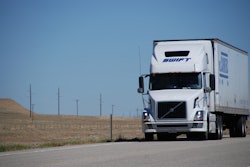When it comes to maintenance and repair, fleets wrestle with handling it themselves or sending vehicles to an outside service provider. There is no one right answer, and it is not necessarily an all-or-nothing proposition.
 Joe Puff is vice president of truck technology and maintenance for NationaLease.
Joe Puff is vice president of truck technology and maintenance for NationaLease.If you decide to outsource some or all of your maintenance and repair, choose your partners carefully. There are some general things you should look for. You want someone who uses clear and direct language in their communication with you; someone who clearly understands your expectations; who fixes any mistakes they make; and lives up to their commitment.
In addition to those general requirements, there are some very specific areas you need to explore with any potential outside service provider.
Operational considerations. This includes the basics. The service provider needs to be located where your vehicles are housed and where they operate. If you do not have a return-to-base business model, you need a provider with locations across the areas your trucks travel so that maintenance can be performed on schedule. Ask about their hours of operation. Will they be able to service your trucks at times that fit your schedule so drivers won’t be inconvenienced? Do they offer after hours service in case a truck breaks down during non-business hours? Ask about the qualification of technicians handling after hour service.
Core services. Explore the types of services they specialize in. Do they match up to the services you need? Do they farm out certain repairs to other service providers? If so, how did they vet those suppliers?
Technicians. Not only do you want to know about the number of technicians, you also want to know what types of certifications they have from OEMs, suppliers as well as the number and type of ASE certifications techs have. However, given the fast pace of change in trucking, you’ll also need to talk to them about what they do in terms of training techs on an ongoing basis. Do they take advantage of the training — online and in person — offered by OEMs and suppliers? Find out what their commitment to training is. Have they mapped out a training plan for each of their technicians?
Bay availability. How long will you have to wait to get a truck into a bay for a PM service or repair? The number of bays and the availability of those bays is critical to getting your trucks back on the road quickly. You do not want your drivers sitting around for hours before a truck even gets in to be diagnosed.
Tools/equipment/parts. In addition to have having bay availability, those bays need to have with the right tools and equipment. From diagnostic tools to specialty tools to regular hand tools, make sure they have what is needed and in the right quantities. Make sure they have the necessary diagnostic software for the types of vehicles you operate. Of course, a repair can’t be completed if parts are not on hand. Look into the depth and breadth of their on hand parts inventory and the sources they work with when they don’t have a needed part in their own inventory. It can be very aggravating when a qualified tech and a well-equipped bay are available for a repair, but the correct parts are nowhere to be found. Does the provider vet quality of parts with customers so the remainder of that parts life will be utilized — not over-utilized or underutilized?
Data/communication. How will the service provider update you about the status of a quote or repair? Will they call you, email you, text you? Do they have a way to update you in real time so you can make decisions about repairs quickly to speed the repair along? Is there transparency throughout the repair process? Is all the information about the truck, including service history, in one place that you can access easily?
There is no one right answer to the outsourcing questions, but there are a host of questions you can ask a potential service provider if the outsourcing route makes sense for you.
Joe Puff has more than 35 years of experience in complex sales and fleet operations, including extensive experience in commercial vehicle maintenance. He is responsible for advising NationaLease members and the National Account team of new truck technology, industry trends, and maintenance best practices.












